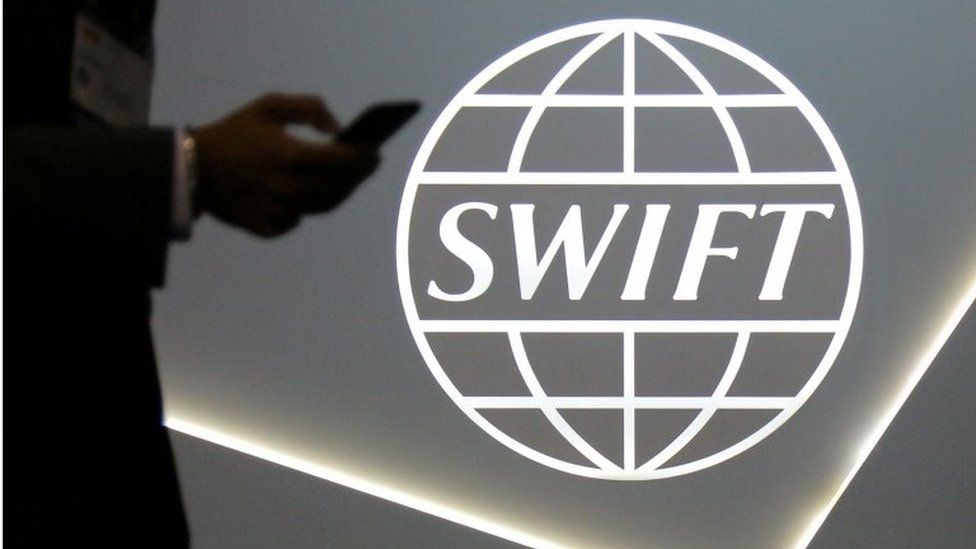The UK repeated calls on Friday for Russia to be banned from the Swift payment network, which is pivotal for the smooth transaction of money worldwide.
Defence Secretary Ben Wallace told the BBC: “Britain wants the Swift system to be turned off for Russia. But unfortunately the Swift system is not in our control. It is not a unilateral decision.”
Banning Russia from the system – which is used by thousands of banks – would hit the country’s banking network and access to funds.
But many governments fear it would hurt their own economies and companies because buying oil and gas from Russia, for example, would be disrupted.
Germany is thought to be resisting a Swift ban. And France’s Finance Minister Bruno Le Maire said on Friday that the option would only be used as a last resort.
What is Swift?
Swift is the global financial artery that allows the smooth and rapid transfer of money across borders. It stands for Society for Worldwide Interbank Financial Telecommunication.
Created in 1973 and based in Belgium, Swift links 11,000 banks and institutions in more than 200 countries.
But Swift is not your traditional High Street bank. It is a sort of instant messaging system that informs users when payments have been sent and arrived.
It sends more than 40 million messages a day, as trillions of dollars change hands between companies and governments.
More than 1% of those messages are thought to involve Russian payments.
Who owns and controls Swift?
Swift was created by American and European banks, which did not want a single institution developing their own system and having a monopoly.
The network is now jointly-owned by more than 2,000 banks and financial institutions.
It is overseen by the National Bank of Belgium, in partnership with major central banks around the world – including the US Federal Reserve and the Bank of England.

Swift helps make secure international trade possible for its members, and is not supposed to take sides in disputes.
However, Iran was banned from Swift in 2012, as part of sanctions over its nuclear programme. It lost almost half of its oil export revenues and 30% of foreign trade.
Swift says it has no influence over sanctions and any decision to impose them rests with governments.
How would banning Russia from Swift affect it?
Russian companies would lose access to the normal smooth and instant transactions provided by Swift. Payments for its valuable energy and agricultural products would be severely disrupted.
Banks would be likely to have to deal directly with one another, adding delays and extra costs, and ultimately cutting off revenues for the Russian government.
Russia was threatened with a Swift expulsion before – in 2014 when it annexed Crimea. Russia said the move would be tantamount to a declaration of war.
Western allies did not go ahead, but the threat did prompt Russia to develop its own, very fledgling, cross-border transfer system.
To prepare for such a sanction, the Russian government created a National Payment Card System, known as Mir, to process card payments. However, few foreign countries currently use it.
Why is the West divided over Swift?
Removing Russia would hurt companies that supply goods to and buy from Russia, particularly Germany.
Russia is the European Union’s main provider of oil and natural gas, and finding alternative supplies will not be easy. With energy prices already soaring, further disruption is something many governments want to avoid.
Companies owed money by Russia would have to find alternative ways to get paid. The risk of international banking chaos is too large, say some people.
Alexei Kudrin, Russia’s former finance minister, suggested being cut off from Swift could shrink Russia’s economy by 5%.
But there are doubts about the lasting impact on Russia’s economy. Russian banks might route payments via countries that have not imposed sanctions, such as China, which has its own payments system.
There is some pressure from US lawmakers for a ban, but President Joe Biden says his preference is for other sanctions, largely because of the hit to other economies and countries.
And a decision to halt Russia’s access would still need the support from European governments, many of which are reluctant because of the possibility of harming their own economies.





























